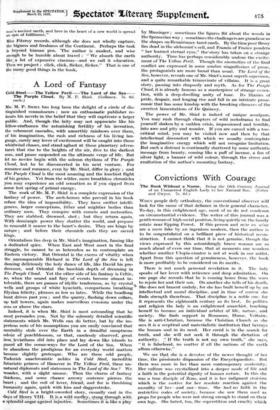A Lord - of Fantasy
Mn.- M. P. Suns, has long been the delight of a circle of dis- tinguished connoisseurs ; now an enthusiastic publisher re- issues his novels-in the-belief-that they will captivate a larger public. And, though-the -laity may. not -appreciate like his fellow-craftsmen the •astonishing fertility of his invention, the vehement cascades, with unearthly rainbows over them, of his imagination, the rush and richness of his living lan- guage, surely' any lover of excitement will be caught into those whisiwind chases, and stand aghast at those planetary adven- ture's that rise to the heights of the air, dive to the darkest seas, and pause suspended on the ultimate verge of life. But let no novice begin with the solemn rhythms of The Purple Cloud, lest he be disconcerted in his next venture. For romance and romance, even by Mr. Shiel, differ in glory ; and The.Purple Cloud is the most amazing and the loneliest flight of his genius. Yet from the wilder, more breathless chronicles you. may experience an odd sensation as if you sipped from some lost spring of primal energy.
The work of Mr. M. P. Shiel is a complete expression of the fantasy of power. The arch-heroes who prevail in his book refuse the idea of impossibility. They have swifter intelli- gences, larger conceptions, Tither and mightier bodies than ordinary men. They conspire with comets and meteorites. They are stabbed, drowned, shot ; but they return again. With demiurgic power they shatter the world, and prepare to remould it nearer to the heart's desire. They are kings by nature ; and before their chronicle ends they are sacred kings.
Orientalism lies deep in Mr. Shiel's imagination, fuming like a dedicated spice. When East and West meet in the final struggle, he cannot be so heterodox as to contemplate an Eastern victory. But Oriental is the excess of vitality when the unconquerable Richard' in The Lord of the Sea is left dancing deliriously the holy dance of life, like David his pre- decessor, and Oriental the haschish depth of dreaming in The.Purple Cloud. Yet the other side_of his fantasy is Celtic, so, when the sound and fury of events become almost in- tolerable, there are pauses of idyllic tenderness, as by crystal wells and groups of white hyacinth, comparisons breathing Elysian felicity, phrases as low as lutes. While the headlong hunt drives past you ; and the quarry, flashing down cellars, up tall towers, again makes marvellous evasions under the seas or above the stars.
Indeed, it is when Mr. Shiel is most astounding that he most persuades you. Not by the solemnly detailed scientific statements which Mr. Wells can do better, but by the im- perious note of his assumptions you are easily convinced that mortality stole over the Earth in a dreadful sumptuous odour of peachblossom, or that, carelessly observed, great iron 'leviathans slid into place and lay down like islands to guard all the ocean-ways for the Lord of the Sea. When he abandons the prodigious for an everyday world matters become slightly grotesque. Who are these odd people, Tudorish anachronistic nobles in Cold Steel, incredible futuristic princes of Hanover in The Yellow Peril, these un- natural diplomats and statesmen in The Lord of the Sea? We wonder, with a slight unease. Then the charm of fantasy thickens, and some chance arrowy sentence pierces the heart ; and the coil of lover, friend, and foe is throbbing humanity again, quick with kiss and daggerstroke.
Cold Steel is a bright-sworded story, casually cast in the days of Henry VIII. It is a wild medley, stunk through with a splendid anger against injustice. Sometimes it is like a play by Massinger ; sometimes the figures flit about the woods in the Spenserian way ; sometimes the challengers are grandiose as the shapes on Renaiance tarot cards. By the time poor Bessy lies dead in the alchemist's-eell, and Francis of France ponders !‘ her learned _eternal eyes," thestory has taken on a strange authority. Time has perhaps considerably undone the excite- ment of The Yellow Peril. Though the enormities of the final conflict are expressed in' some sombre Magnificence of prose, the protagonists are more banal than usual. The Lord of the Sea, however, reveals one of Mr. Shiers most superb supermen, and a quite remarkable triumvirate of villains. It is a great story, passing into rhapsody and myth. As for The Purple Cloud, it is already famous as a masterpiece of strange evoca- tion, with a deep-dwelling unity of tone. Its litanies of Pride, despair, and longing rise and fall in an intricate prose- inusic that has some kinship with the breaking climaxes of the sweetest lamentations of De Quincey.
The power of Mr. Shiel is indeed of unique amalgam. You may rush through chapters of wild melodrama to find yourself shaken by a sudden crisis, impassioned and terrible, into awe and pity and wonder. If you are cursed with a too- critical mind, you may be visited now and then by that intellectual discomfort with which we usually contemplate the imaginative energy which will not recognize limitation. But such a distrust is continually shattered by some authentic message from beauty, coming like a puff of incense, a fan of Silver light, a banner of wild colour,• through the stress and exultation of the author's mounting fantasy.
















































 Previous page
Previous page